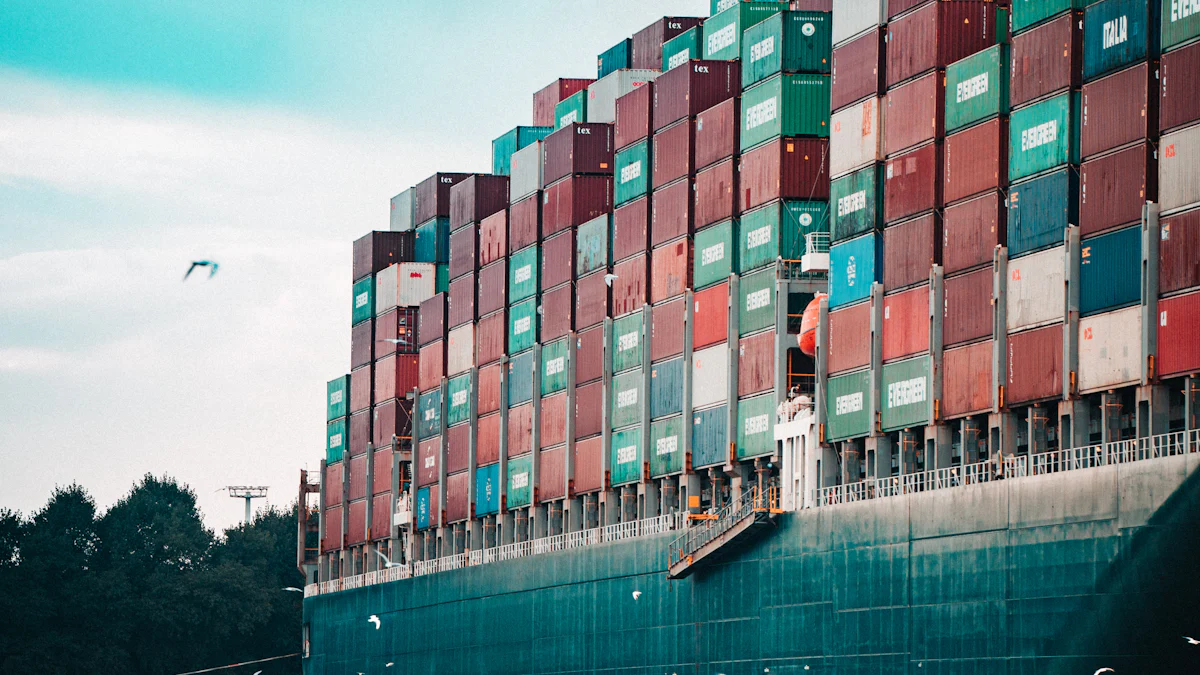Eco-Friendly Green Logistics Strategies by JUSDA

In the realm of logistics, the significance of green logistics cannot be overstated. With a focus on sustainability and environmental responsibility, companies like JUSDA are leading the charge towards eco-friendly practices. JUSDA's unwavering commitment to sustainable operations sets a prime example in the industry. This blog delves into the innovative green logistics strategies implemented by JUSDA, showcasing how these initiatives not only benefit the environment but also drive operational efficiency. Join us on this journey to explore the intersection of logistics and sustainability with JUSDA as our guide.
Understanding Green Logistics

Green Logistics encompasses practices that focus on reducing the environmental impact of transportation and supply chain activities. It involves implementing sustainable measures to create a more eco-friendly way of moving goods, emphasizing the transition to eco-friendly alternatives.
Definition and Scope
What is Green Logistics?
Green Logistics refers to the integration of environmentally friendly practices into logistics operations. It aims to minimize the carbon footprint and overall environmental impact of the supply chain by optimizing transportation, warehousing, and distribution processes.
Scope and Importance in the Modern Supply Chain
The scope of Green Logistics extends beyond traditional logistics functions. It includes strategies for reducing waste, fuel consumption, greenhouse gas emissions, and energy usage throughout the entire supply chain network. The importance of green logistics lies in its ability to align business operations with sustainability goals while meeting customer demands for environmentally responsible practices.
Key Concepts in Green Logistics
Carbon Footprint Reduction
One fundamental concept in Green Logistics is carbon footprint reduction. This involves minimizing the amount of greenhouse gases emitted during transportation and storage activities. By optimizing routes, utilizing energy-efficient vehicles, and adopting sustainable packaging solutions, companies can significantly reduce their carbon emissions.
Sustainable Resource Management
Another key concept is sustainable resource management, which focuses on using resources efficiently while minimizing waste generation. Implementing recycling programs, sourcing materials from renewable suppliers, and optimizing inventory levels are essential strategies within green logistics to promote resource conservation.
Energy Efficiency
Energy efficiency plays a crucial role in green logistics by reducing energy consumption across various operational processes. Implementing energy-saving technologies in warehouses, utilizing alternative fuels for transportation, and optimizing equipment usage contribute to lowering overall energy consumption and promoting sustainable practices.
JUSDA's Green Logistics Strategies
Green Channel of Customs
To expedite the customs clearance process, JUSDA implements streamlined procedures that reduce waiting times and paperwork. By leveraging digital documentation, the company minimizes the environmental impact associated with traditional customs processing.
Sustainable Transportation Solutions
JUSDA embraces sustainable transportation methods by offering customized train services for both domestic and international cargo movements. The utilization of electric and hybrid vehicles further enhances their commitment to eco-friendly logistics. Additionally, route optimization techniques are employed to maximize efficiency in delivery operations.
Eco-Friendly Warehousing Practices
In its warehouses, JUSDA prioritizes energy-efficient lighting and equipment to minimize energy consumption. Waste reduction and recycling programs are integral components of their sustainability efforts, ensuring minimal environmental impact through responsible waste management practices.
Minimizing Carbon Footprint in Final Deliveries
The focus on minimizing the carbon footprint in final deliveries is a core aspect of JUSDA's green logistics strategy. Through meticulous planning and efficient route optimization, JUSDA reduces unnecessary mileage and fuel consumption, thereby lowering the overall carbon emissions associated with the last mile delivery operations.
JusLink: A Green Logistics Product
Overview of JusLink
JusLink represents a cutting-edge green logistics product offered by JUSDA. This innovative platform integrates advanced technologies to streamline supply chain management processes, enhancing operational efficiency while promoting sustainability. With features designed to optimize logistics routes and reduce environmental impact, JusLink stands as a testament to JUSDA's commitment to eco-friendly practices.
How JusLink Contributes to Sustainability
JusLink plays a pivotal role in advancing sustainability within logistics operations. By leveraging data analytics and intelligent system platforms, this green logistics product enables precise route planning, leading to reduced fuel consumption and lower greenhouse gas emissions. The integration of JusLink into supply chain processes not only enhances operational performance but also underscores JUSDA's dedication to environmentally conscious practices.
Benefits of Implementing Green Logistics

Environmental Benefits
Reduction in Greenhouse Gas Emissions
Implementing green logistics practices leads to a significant decrease in greenhouse gas emissions. By optimizing transportation routes and utilizing energy-efficient vehicles, companies like JUSDA actively reduce their carbon footprint, contributing to a cleaner environment.
Conservation of Natural Resources
One of the key advantages of embracing green logistics is the conservation of natural resources. Through sustainable practices such as waste reduction programs and responsible sourcing, businesses ensure the efficient use of resources while minimizing environmental impact.
Economic Benefits
Cost Savings from Energy Efficiency
The adoption of green logistics strategies results in substantial cost savings through enhanced energy efficiency. By investing in energy-saving technologies and optimizing operational processes, companies like JUSDA reduce their overall expenses while promoting sustainability.
Enhanced Brand Reputation and Customer Loyalty
An often overlooked benefit of prioritizing green logistics is the enhancement of brand reputation and customer loyalty. Businesses that demonstrate a commitment to environmental responsibility attract environmentally conscious consumers, leading to increased brand trust and long-term customer relationships.
Challenges and Solutions in Green Logistics
Common Challenges
High Initial Investment Costs
Initiating green logistics practices often requires a significant upfront financial commitment. This initial investment encompasses the adoption of eco-friendly technologies, the implementation of sustainable transportation solutions, and the integration of energy-efficient systems across the supply chain.
Developing a comprehensive green logistics strategy may pose financial challenges for companies, especially those transitioning from traditional logistics models. The costs associated with upgrading infrastructure, training personnel on sustainable practices, and complying with environmental regulations can be substantial.
Overcoming the hurdle of high initial investment costs necessitates a strategic approach that balances short-term expenditures with long-term benefits. Companies must evaluate the return on investment from implementing green logistics initiatives to justify the financial outlay and secure sustainable operations in the future.
Technological Barriers
Embracing green logistics is often hindered by technological barriers that impede the seamless integration of sustainable practices into existing supply chain operations. Companies encounter obstacles related to compatibility issues between eco-friendly technologies and legacy systems, limiting the efficiency gains achievable through green initiatives.
Addressing technological barriers requires a concerted effort to upgrade digital infrastructure, enhance connectivity between different logistical functions, and invest in innovative solutions that facilitate eco-friendly operations. Overcoming these challenges involves leveraging advanced software platforms, IoT devices, and data analytics to optimize resource utilization and minimize environmental impact.
By proactively identifying and mitigating technological barriers, companies can unlock the full potential of green logistics strategies while enhancing operational efficiency and sustainability across their supply chains.
JUSDA's steadfast dedication to green logistics shines as a beacon of sustainability in the industry. Their innovative strategies, from streamlined customs processes to last-mile delivery optimization, not only benefit the environment but also drive operational efficiency. Embracing eco-friendly practices is not just a trend; it's a strategic move towards cost-effective and sustainable transportation solutions. As upcoming regulations worldwide focus on reducing carbon emissions, businesses are urged to adopt green logistics for improved environmental performance and reduced costs. It's time for companies to prioritize sustainability and shape a greener future for logistics.
See Also
Effective Tactics for Advanced Manufacturing with JUSDA's Supply Chain Solutions
Key Approaches to Enhance Automotive Supply Chain Performance | JUSDA Insights
Success Story: JUSDA's Warehouse Automation Triumph
Enhancing Supply Chain Efficiency: Meaning, Advantages, and Approaches
